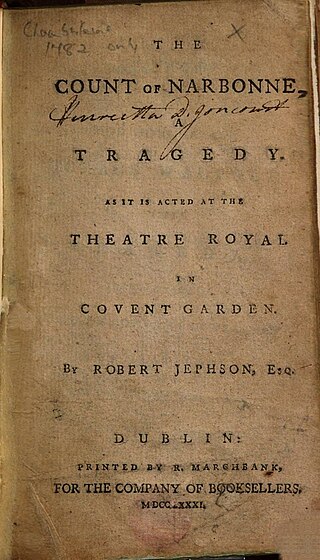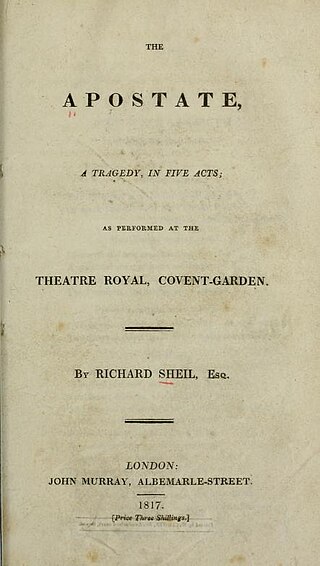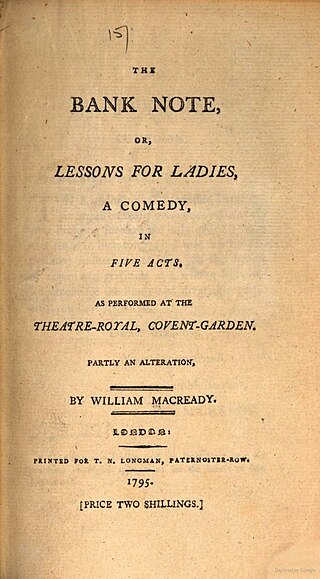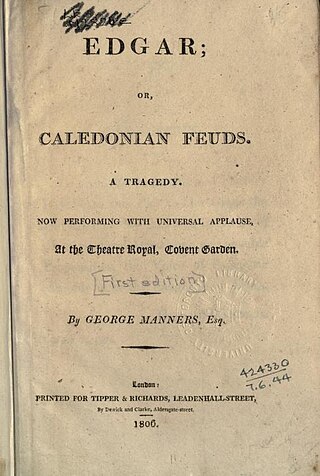Related Research Articles

The Count of Narbonne is a 1781 tragedy by the Irish writer Robert Jephson. It was inspired by Horace Walpole's novel The Castle of Otranto.

Swedish Patriotism is an 1819 stage melodrama by the British writer and actor William Abbot. It premiered at the Theatre Royal, Covent Garden on 19 May 1819. The London cast included Daniel Terry as Colonel Walstein, Abbot as Captain Albert, Maria Foote as Ulrica, John Liston as Walter, William Chapman as Cokaski, Charles Connor as Colonel Langstorff and Daniel Egerton as Count Cronstedt. It then appeared at the Park Theatre in New York on 1 December 1819 with Robert Maywood as Walstein.

The Youthful Days of Frederick the Great is an 1817 stage melodrama by the British writer and actor William Abbot. It premiered at the Theatre Royal, Covent Garden in London on 2 October 1817. The cast included Daniel Terry as Frederick William, King of Prussia, Abbot as The Prince Royal, Daniel Egerton as Baron Kniphausen, Chapman as Count Seckendoff, Charles Connor as Anhalt, Charles Farley as Frederstoff and Harriet Faucit as Christine.
Fredolfo is an 1819 historical tragedy by the Irish writer Charles Maturin. It premiered at the Theatre Royal, Covent Garden in London on 12 May 1819. The original cast included William Macready as Wallenberg, Charles Mayne Young as Fredolfo, Charles Kemble as Aldemar, Frederick Henry Yates as Berthold, Charles Connor as Waldo and Elizabeth O'Neill as Urilda. Maturin dedicated the published version to the Duke of Leinster, which was published by Archibald Constable. The work was considered a failure which failed to recaptured the success of his earlier Bertram and Maturin turned back to writing novels.

Manuel is an 1817 tragedy by the Irish writer Charles Maturin. It premiered at the Theatre Royal, Drury Lane in London on 8 March 1817. The original cast included Edmund Kean as Manuel, Count Valdi, Alexander Rae as De Zelos, James William Wallack as Torrismond, Charles Holland as Mendizabel, Thomas Cooke as Almorad, John Powell as Guide and Margaret Somerville as Victoria. The published work is dedicated to the writer Walter Scott. It takes place in the wake of the Battle of Las Navas de Tolosa in Spain. It failed to recapture the success of his debut play Bertram of the previous year, despite both starring Kean.

Bertram; or The Castle of St. Aldobrand is an 1816 Gothic tragedy by the Irish writer Charles Maturin, his first and most successful play. It premiered at the Theatre Royal, Drury Lane in London on 9 May 1816. The original case included Edmund Kean as Bertram, Alexander Pope as St Aldobrand, Charles Holland as Prior of St Anselm, John Powell as Monk, Thomas Cooke as Robber, Margaret Somerville as Imogine and Susan Boyce as Clotilda. The prologue was written by John Hobhouse. The 1827 opera Il pirata composed by Vincenzo Bellini uses a libretto by Felice Romani inspired by Maturin's work.
Retribution is an 1818 British tragedy by the writer John Dillon. It premiered at the Theatre Royal, Covent Garden in London on 1 January 1818. The original London cast included Charles Mayne Young as Veranes, King of Persia, William Macready as Chosroo, Charles Kemble as Hamed, Daniel Egerton as Abdas, William Abbot as Hafiz, Daniel Terry as Suthes, Charles Connor as Sohrab and Elizabeth O'Neill as Zimra.

Fazio is a tragedy by the British writer Henry Hart Milman. It was first published in 1815. An unauthorised adaptation was performed at the Surrey Theatre under the title The Italian Wife. Another unauthorised version was performed at the Theatre Royal, Bath. In 1818 Milman granted permission for the Theatre Royal, Covent Garden to stage the play. It premiered there on 5 February 1818. It starred Charles Kemble as Giraldi Fazio, Elizabeth O'Neill as Bianca, Daniel Egerton as the Duke of Florence, Charles Mathews as Gonsalvo, William Blanchard as Bartolo, Harriet Faucit as Aldabella and Charles Connor as Falsetto. A first Dublin performance took place at the Crow Street Theatre on 6 April 1818. Fanny Kemble later played Bianca in Britain and America, where she appeared at the Park Theatre in 1832. It was revived on both sides of the Atlantic over the following decades.

The Conquest of Taranto is an 1817 musical drama written by William Dimond with music composed by Michael Kelly. It appeared at the Theatre Royal, Covent Garden on 15 April 1817. The original cast featured Junius Brutus Booth as Rinaldo, William Macready as Valencia, Charles Mayne Young as Aben Hamet, Daniel Egerton as Gonzales, Sarah Booth as Oriana and Kitty Stephens as Rosalind. Macready was reportedly dissatisfied with his role, coveting that of Rinaldo, and unsuccessfully offered thirty pounds the Covent Garden manager Thomas Harris to release him during rehearsals. The first Dublin performance was at the Crow Street Theatre on 5 August 1817. It also appeared at the Federal Street Theatre in Boston and other American venues.

Damon and Pythias is an 1821 tragedy by the Irish writers John Banim and Richard Lalor Sheil. It is based on the Greek legend of Damon and Pythias. It premiered at the Theatre Royal, Covent Garden in London on 28 May 1821. The original cast included William Macready as Damon, Charles Kemble as Pythias, William Abbot as Dionysius, Daniel Egerton as Damocles, William Chapman as Nicias, Thomas Comer as Procles, Charles Connor as Lucullus and Maria Foote as Hermion. It was widely performed in Ireland and the United States including at the Chestnut Street Theatre in Philadelphia.

Evadne is an 1819 historical tragedy by the Irish writer Richard Lalor Sheil. It premiered at the Theatre Royal, Covent Garden in London on 10 February 1819. The original cast included Elizabeth O'Neill as Evadne,William Macready as Ludovico, William Abbot as the King of Naples, Charles Mayne Young as Colonna, Charles Kemble as Vicentio, Charles Connor as Spalatro and Harriet Faucit as Olivia. Sheil dedicated the published play to his fellow Irish writer Thomas Moore.

The Apostate is an 1817 tragedy by the Irish writer Richard Lalor Sheil. It premiered at the Theatre Royal, Covent Garden on 3 May 1817. The original cast included William Macready as Pescara, Charles Kemble as Hemeya, Charles Mayne Young as Malec, Thomas Comer as Hamy, Charles Murray as Alvarez, Daniel Egerton as Gomez and Elizabeth O'Neill as Florinda. The prologue was spoken by Charles Connor. It was loosely inspired by a 17th century work by the Spanish playwright Pedro Calderón de la Barca. The play was a success, but reviewers generally attributed this to O'Neill's acting rather than Sheil's writing.
Bellamira is an 1818 historical tragedy by the Irish writer Richard Lalor Sheil. It premiered at the Theatre Royal, Covent Garden in London on 22 April 1818. The original cast included Elizabeth O'Neill as Bellamira, William Macready as Amurath, Charles Kemble as Manfredi, Charles Mayne Young as Montalto, Daniel Terry as Salerno, Charles Connor as Kaled, and Thomas Comer as Gonzaga. Sheil dedicated the play to the Whig politician Lord Holland.

Zorinski is a 1795 historical tragedy by the British writer Thomas Morton. It first appeared at the Theatre Royal, Haymarket in London with a cast that included William Barrymore as Zorinski, James Aickin as Casimir, King of Poland, Robert Bensley as Rodomsko, Charles Kemble as Radanzo, John Bannister as Zarno, John Henry Johnstone as O'Curragh, Richard Suett as Amalekite, John Fawcett as Witski, Thomas Caulfield as Naclo, Elizabeth Kemble as Rosolia and Maria Bland as Winifred. It included music composed by Samuel Arnold. The Irish premiere was at the Crow Street Theatre in Dublin on 28 November 1795. It is also known by the alternative title Casimir, King of Poland

The Bank Note: Or Lessons for Ladies is a 1795 comedy play by the Irish writer and actor William Macready the Elder. It premiered at the Theatre Royal, Covent Garden in London on 1 May 1795. The original cast included Macready as Lieutenant Selby, Joseph George Holman as Sir Charles Leslie, James Middleton as Bloomfield, Thomas Hull as Father, John Fawcett as Ned Dash, John Quick as Hale, John Henry Johnstone as Killeavy, Edward Townsend as Tim, Elizabeth Hopkins as Miss Emma Hale, Isabella Mattocks as Mrs Bloomfield, Mary Ann Davenport as Lady Supple and Tryphosa Jane Wallis as Miss Russel. The Irish premiere took at the Crow Street Theatre in Dublin on 22 April 1796 Its plot draws inspiration from William Taverner's The Artful Husband as well as other earlier plays.

The Mouth of the Nile; Or, The Glorious First of August is a 1798 patriotic musical written by the British author Thomas John Dibdin with music composed by Thomas Attwood. It celebrated the recent naval victory of Horatio Nelson over the French at the Battle of the Nile. It premiered at the Theatre Royal, Covent Garden on 25 October 1798 as an afterpiece. The original cast included Edward Townsend as Jack Junk, John Fawcett as William, Dibdin as Pat, Charles Incledon as Michael and Sarah Sims as Susan. The prologue was written by Richard Cumberland. The Irish premiere took place at the Crow Street Theatre in Dublin on 18 December 1799.

The Fatal Falsehood is a 1779 tragedy by the British writer Hannah More. It premiered at the Theatre Royal, Covent Garden in London on 7 May 1779. The original cast included Matthew Clarke as Earl Guilford, William Thomas Lewis as Rivers, his son, Richard Wroughton as Orlando, a young Italian Count, Francis Aickin as Bertrand, Elizabeth Younge as Emmelina and Elizabeth Hartley as Julia. The prologue was written by Richard Brinsley Sheridan.

Who's the Dupe? is a 1779 comedy play by the British writer Hannah Cowley. A two-act farcical afterpiece, it premiered at the Theatre Royal, Drury Lane in London on 10 April 1779. The original cast included William Parsons as Doiley, James Aickin as Sandford, John Palmer as Granger, Thomas King as Gradus, Priscilla Brereton as Elizabeth and Mary Ann Wrighten as Charlotte. The Irish premiere was at the Smock Alley Theatre in Dublin on 8 February 1791. Cowley had enjoyed success with her debut play The Runaway and followed it with the tragedy Albina and this farce. It became one of her most popular works.

Adelaide is an 1800 historical tragedy by the English writer and poet laureate Henry James Pye. It premiered at the Theatre Royal, Drury Lane in London on 25 January 1800. The original cast included Sarah Siddons as Adelaide, James Aickin as King Henry, John Philip Kemble as Prince Richard, William Barrymore as Prince John, Charles Kemble as Clifford, Thomas Cory as Legate and Walter Maddocks as Officer and Elizabeth Heard as Emma. It is set during the reign of Henry II.

Edgar; Or, Caledonian Feuds is an 1806 historical tragedy by the British writer George Manners. I was inspired by Ann Radcliffe's novel The Castles of Athlin and Dunbayne. It premiered at the Theatre Royal, Covent Garden in London on 9 May 1806. The original cast included Sarah Smith as Edgar, Henry Erskine Johnston as Osbert, Alexander Pope as Baron, William Chapman as Malcolm, William Claremont as Count Zulmio, Charles Klanert as Officer, Nannette Johnston as Matilda and Louisa Brunton as Emma. The Irish premiere took place at the Crow Street Theatre in Dublin on 30 April 1808.